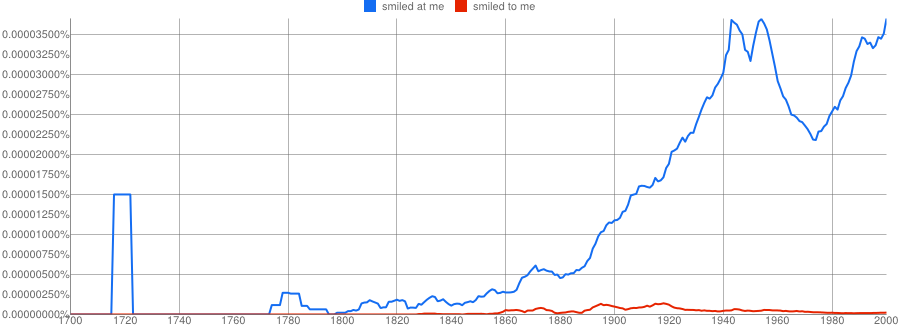I searched for the following two expressions and came across both being used in various places.
She smiled at me at the grocery store.
She smiled to me at the grocery store.
What is the difference between the two?
"Smile at" is more common, so saying "smile to" is a way to indicate a more "decisive" smile, or intent to communicate via the smile.
I do not understand why others say "to" is incorrect here. It is less common, to be sure, but that does not make it incorrect. You can wave to a crowd, or wave at a crowd...but just because we say "wave to" more often, that does not make "wave at" incorrect.
Although I agree that "smiled to me" does get said sometimes, "smiled at me" is the technically correct version. Usage reflects this, as shown in this NGram shows:

Also, Dictionary.com does not have an entry for "smiled to", only "smiled at".
I wonder if "smile to" was invented as a gentler sounding form of "smile at", in the same way that "talk to" is gentler and less-aggressive than "talk at".
I searched the BNC, and here are the results.
Ignoring cases like "smile to verb", "smile to oneself" or "smile to the side", I've been able to find only 4 examples of "smile to somebody".
In COCA, there are 15 examples only. I'd say it's pretty rare.
The OED does say that smile to somebody is possible, cf. "2a. To look on, upon, at, or to a person with a smile or pleasant expression. Also with advs., as back, down, over, up."
1749 T. Smollett tr. A. R. Le Sage Gil Blas IV. xii. xiii. 223 At these words of my god-daughter, I smiled to her father.
Now, there is another interesting expression, "to smile at/for/to the cameras".
The second is not correct. I'm not sure what the technical term for it is, but smiling doesn't take an object - saying "she smiled at me" is like saying "she sat to me" or "she ate to me". It doesn't make sense. To a lesser extent, any expression is the same - you can frown at someone, but you can't frown to someone.
According to this link, one should use "at" with static, non-movement verbs and "to" with verbs of movement. Hence, "she smiled at me" and then she "waved to me".